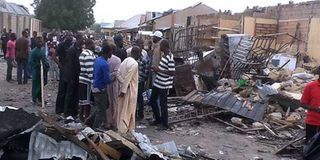Seven killed in Nigeria violence as kidnapped schoolgirls still missing

PHOTO | AFP People stand at the scene a day after two explosions killed at least 35 people in a crowded neighbourhood of Nigeria's restless northeastern city of Maiduguri, a stronghold of Boko Haram Islamists, on March 2, 2014. At least seven people were killed in ethnic and religious violence in eastern Nigeria’s Taraba state, police said on April 17, 2014 with local residents putting the toll at 20.
What you need to know:
- Christian Jukun gunmen attacked their Muslim Hausa-Fulani neighbours in a reprisal
- Violence erupted in the town of Wukari on Tuesday through Wednesday when Christian Jukun gunmen attacked their Muslim Hausa-Fulani neighbours in a reprisal attack following fighting in a nearby village, state police spokesman Joseph Kwaji told AFP.
KANO
At least seven people were killed in ethnic and religious violence in eastern Nigeria’s Taraba state, police said Thursday, with local residents putting the toll at 20.
Violence erupted in the town of Wukari on Tuesday through Wednesday when Christian Jukun gunmen attacked their Muslim Hausa-Fulani neighbours in a reprisal attack following fighting in a nearby village, state police spokesman Joseph Kwaji told AFP.
“Seven people were killed in the violence which started late Tuesday and continued overnight,” he said.
He said some 40 homes were razed in the violence, the latest to hit the deeply divided state in recent months.
“Jukun youths launched reprisal attacks on the Hausa-Fulani following an earlier bloody encounter with their kinsmen in neighbouring Nwunkyo-Kura village,” Kwaji said.
He said soldiers and police had deployed to contain the violence, but added that no arrests had been made.
Residents said the Jukuns had joined their kinsmen in Nwunkyo-Kura on Tuesday to fight suspected Fulani attackers who stormed the village from neighbouring Plateau state.
Ali Shehu, a Wukari resident, said he personally counted 14 bodies after the violence and was told of six other corpses found in different parts of the town.
“We just came under gun attack without any justification,” said Shehu, whose house was also razed during the fighting.
Religiously divided Taraba has seen a wave of ethnic and sectarian violence in recent months as the Jukun and their neighbours jostle for political control of the state.
On April 5, the state government imposed a round-the-clock curfew on the town of Ibi following bloody fighting between the two rivals which left many people dead.
Anxious Nigerian parents demanded answers on Thursday about the fate of their daughters after the military claimed that 121 schoolgirls kidnapped by Boko Haram Islamic extremists were now free.
Defence spokesman Chris Olukolade had initially said that 129 girls were abducted by gunmen in the Chibok area of the northeastern Borno state late Monday.
The mass kidnap — which has sparked global outrage — came just hours after the deadliest attack ever in the Abuja, where a blast also blamed on Boko Haram killed 75 people.
Olukolade said that all but eight of the girls were safe, citing information provided by the school’s principal, but families contested the claim.
The defence spokesman’s claim has been widely disputed, including by parents who voiced anger at the allegedly false information.





